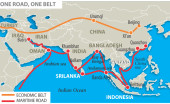Re Ian Bremmer 'Could third-party candidates upend the 2024 US election?' 3 April The current political movement in the USA…
Wednesday Night #1852
Written by Diana Thebaud Nicholson // September 6, 2017 // Wednesday Nights // Comments Off on Wednesday Night #1852
It is hard to understand why the world has taken so long to acknowledge the dreadful situation in Myanmar (Burma) where the persecution of the Rohingya has driven a mass exodus to Bangladesh. Now, UN Secretary-General Antonio Guterres warned of the risk of ethnic cleansing and regional destabilization. He urged the U.N. Security Council to press for restraint and calm in a rare letter to express concern that the violence could spiral into a “humanitarian catastrophe.”
UN aid agencies continue to be blocked from delivering food, water and medicine to the Rohingya, while humanitarian workers on the ground say warehouses stocking vital emergency supplies are being looted.
The world is paying attention to North Korea and is worried. Doubts about the efficacy of sanctions are growing as North Korea warns of ‘gift packages’ for US. The US administration seems to be wedded to sabre rattling, while South Korea espouses a diplomatic approach Vladimir Putin has urged the U.S. and others to avoid going down a “dead-end road” with North Korea on Friday, adding only dialogue without pre-conditions could resolve the crisis. Bob Gallucci, Clinton’s chief negotiator for the 1994 agreement agrees in this PBS Newshour interview How does North Korea’s latest nuclear breakthrough affect U.S. options? “If the North will come to the table, if the United States will come to the table without preconditions and begin a discussion, then there are ways to dismantle, take apart nuclear weapons programs. We did that in the case of Iraq some time ago. … We certainly can do it in the case of North Korea, if the North Koreans are persuaded that they can achieve their security objectives, achieve their security objectives without nuclear weapons.”
North Korea’s Nuclear Arsenal Threatens China’s Path to Power offers another dimension: “China’s path to dominance requires an American withdrawal and a message to American allies that they cannot count on the United States for protection. But North Korea threatens to draw the United States more deeply into the region and complicate China’s effort to diminish its influence and persuade countries to live without its nuclear umbrella. At the same time, the strategic location of the North — and its advancing nuclear capabilities — make it dangerous for China to restrain it.”
Writing in TIME, (5 Reasons Things in North Korea Could Still Go Badly Wrong) Ian Bremmer of the Eurasia Group concluded:
“North Korea may be the single most difficult geopolitical challenge the world faces. Plenty of big time powers want opposing things, and all of them fear taking decisive action will leave them worse-off in the long run. Yet the longer no one does anything, the longer the problem festers, and at a certain point someone desperate will act, forcing everybody’s hand. There’s always a chance that cooler heads prevail and traditional diplomacy will work, but the world just hasn’t had that type of luck lately.” This seems as good a summary today as on 21 August when it was published.
(The Atlantic) Jeff Sessions announced that the Trump administration will end the Deferred Action for Childhood Arrivals program with a six-month delay, a decision that strongly aligns with the attorney general’s personal views on immigration. Supporters of reduced immigration praised the White House but questioned what would happen next as Congress works to draft immigration legislation among its myriad other responsibilities. And David Frum argues that Trump’s actions will only end up hurting efforts at tougher immigration laws in the long run.
The expected announcement on Tuesday has generated fierce reaction from all sides.
“The program known as DACA that was effectuated [Yes, that’s what he said – ‘effectuated’] under the Obama administration is being rescinded,” Attorney General Jeff Sessions announced in a televised statement.
President Trump released a written statement that cast President Obama’s creation of the DACA program as going beyond his constitutional responsibilities.
“There can be no path to principled immigration reform if the executive branch is able to rewrite or nullify federal laws at will,” Trump said” [Oh, the delicious irony!]
The Washington Post’s Philip Bump draws a comparison with Trump’s pardon of Joe Arpaio This is the Trump administration’s most stunningly cynical excuse for ending DACA and concludes “What’s surprising is that the White House cites its strict respect for law and order as a rationale for ending a program that necessitates a higher standard of behavior from applicants than the president believes should apply to his political allies.”
Former president Obama wrote in a lengthy Facebook post that he decided to create DACA during his presidency because “it made no sense to expel talented, driven, patriotic young people from the only country they know solely because of the actions of their parents.To target these young people is wrong — because they have done nothing wrong. It is self-defeating — because they want to start new businesses, staff our labs, serve in our military, and otherwise contribute to the country we love. And it is cruel,” he wrote.
For those who prefer to worry about the global economy, bitcoins are back in the news. Barbarians at the Monetary Gate draws attention to a “2016 working paper by the International Monetary Fund that distinguished digital currency (legal tender that could be digitized) from virtual currency (non-legal tender). Bitcoin is a cryptocurrency, or a kind of virtual currency that uses cryptography and distributed ledgers (the blockchain) to keep transactions both public and fully anonymous. Nine years after [Satoshi] Nakamoto introduced bitcoin, the concept of private electronic money is poised to transform the financial-market landscape. This month, the value of bitcoin reached $4,483, with a market cap of $74.5 billion, more than five times larger than at the beginning of 2017. Whether this is a bubble, destined to collapse, or a sign of a more radical shift in the concept of money, the implications for central banking and financial stability will be profound. Meanwhile, ” national authorities were wary of potential illegal uses of such assets, reflected in the bitcoin-enabled, dark-web marketplace called Silk Road, a clearinghouse for, among other things, illicit drugs.”
If you have not been paying attention, the BRICS summit, hosted by China, highlight[ed] Trump’s Deepening Isolation on Trade and Foreign Policy. “The summit’s overall message, and the combative tone of its most important speakers, suggests world leaders are growing impatient with Trump’s “American First” agenda and his constant references to “unfair” trade deals. His decision to withdraw from a global accord on climate change earlier this year was also referenced by Xi, who said that “multi-lateral trade negotiations make progress only with great difficulty and the implementation of the Paris Agreement has met resistance.”
AND the second round Of NAFTA talks ended on Tuesday with 3 Countries Saying Some Progress Made. The next round will take place in Ottawa Sept. 23-27, when serious horse-trading is expected to begin.(Some good links from this page)
Houston is slowly emerging from the traumatic events of Hurricane Harvey. It will, of course, be years before the city is rebuilt with, we hope, due attention to the factors that can mitigate the damage of future storms. The costs of rebuilding and restoring are going to be astronomical and Congress will be voting on the first disaster relief package (which could be tied to raising the nation’s debt limit) on Wednesday. FEMA may soon face another challenge, this one from category 5 storm Hurricane Irma headed for Antigua and Barbuda then Puerto Rico, Dominican Republic, Haiti, Cuba and Florida. President Trump has declared emergencies in Florida, Puerto Rico and the US Virgin Islands.
It’s a fine line between political cronyism and corruption – a line that seems to have been crossed in the case of Carl Icahn’s role as ‘Trump’s Favorite Tycoon’ aka special advisor to the president on issues relating to regulatory reform. In August, he resigned from his Trump advisor role ahead of an article alleging conflict of interest. The article in The New Yorker, Carl Icahn’s Failed Raid on Washington, paints a sordid picture of Mr. Icahn’s role, while pointing out that “Conflicts of interest have been a defining trait of the Trump Administration.”
Two recent news items underline the blatant triumph of politics over competence among the Trump administration’s appointees:
NRA Official Lands Seat On National Park Foundation Board
Susan LaPierre, co-chair of the National Rifle Association’s Women’s Leadership Forum and wife of NRA Executive Director Wayne LaPierre, has landed a seat on the National Park Foundation’s board of directors. Mrs. LaPierre was one of four appointments to the board made earlier this year. None of the appointments was announced in a release by either the Interior Department or Park Foundation.
The NRA poured a reported $50m (£46m) into Mr Trump’s campaign, along with those of six Republican Senate candidates in a bid to ensure Washington support for gun rights.
EPA now requires political aide’s sign-off for agency awards, grant applications John Konkus, the political operative in charge of vetting the hundreds of millions of dollars in grants the EPA distributes annually and making final funding decisions, is a former Trump campaign aide with little environmental policy experience.
Finally, on a lighter note.
Cause for celebration for all of us who are addicted to John le Carré and especially to George Smiley. A Legacy of Spies is available in North America as of 5 September. Yes, we pre-ordered it. It has been greeted with rapturous reviews by all.
John Le Carré’s ‘A Legacy of Spies’ asks all the questions we’re thinking in 2017
and a bit of trivia for aviation buffs
The story of why pilots say “Roger that” – a rather long-winded account of the evolution from ‘received’ to the abbreviation ‘R’ to Roger when pilots stopped using Morse code and switched to voice operation. ‘Roger’ became the designation for R in 1927 as part of the first phonetic alphabet, developed by the International Telegraph Union. It was replaced by ‘Romeo,’ but by 1957 “Roger” was already synonymous with received. And ‘Roger Wilco’? Wilco is just the short form of will comply. Aren’t you glad we do such extensive research?



